

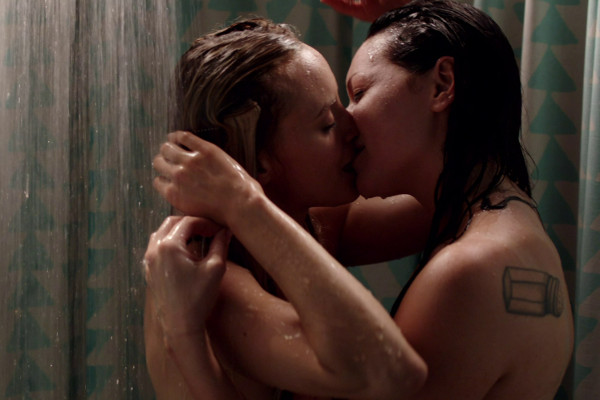
The programme is available on BluRay via Amazon. Although Orange Is The New Black doesn't really fit The Anorak Zone's Cult/SF leanings, it was so well liked that I started ranking each season from 2016 onwards, casting an eye each year over seasons 4-6. As this meant that the first three seasons never got the "worst to best" treatment, I decided to revisit them; giving them a second viewing not only fills in the "gaps", but also allows a chance of more insight...
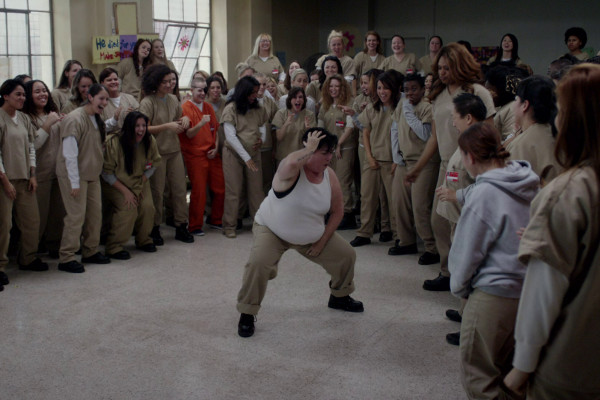
The first two seasons of Orange Is The New Black were the show at its peak, and even the weakest episodes during the first two years stand above the majority of what came later. However, the first year does suffer slightly from a mid-season slump in the narrative. It's an event that it's able to fully recover from, but does mean that the bottom of this ranking is entirely composed of mid-season entries.
Co-Producer Lauren Morelli wrote eleven episodes of the series during its first five seasons. While many of them were quite highly rated in seasons previously covered on the Anorak Zone (including the first-placed season four episode), this is a shaky start, with dialogue and characterisation that borders on childish.
One highlight is what's probably an in-joke, as Kate Mulgrew (Star Trek Voyager) has Nicholls say to her "I thought I was like your Spock", leading to her uncomprehending "My what?" However, it's one of the few moments of actual wit in a show that degrades all the characters that the series had carefully built up. Consequently the episode comes over as one of the sillier season five episodes in intent, even if it's still tied to something "real".
The flashback shows the bad life of Nicholls and her dysfunctional relationship with her mother, and contrasts it with flashbacks on her relationship with Red. However, it's very "bitty", intercut with flashbacks on Piper and Alex's relationship, and the narrative cohesion that the first four episodes built up feels lost here.
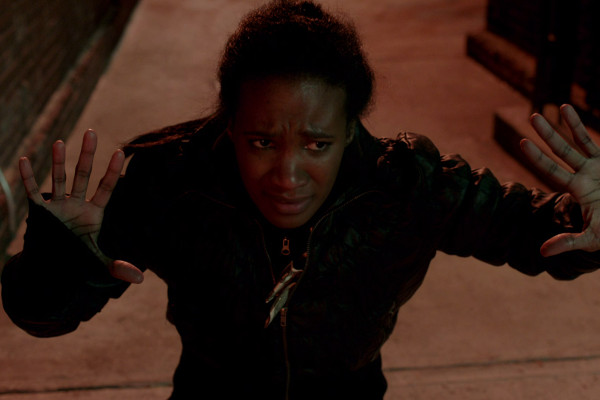
The mid-season dramatic slump continues, as the flashbacks take on the former life of Janae Watson, one of the least sympathetic regulars in the show. Although it tries to somehow humanise Watson, the backstory isn't given enough time to really add much meat to the bones. Watson's involvement also incurs one of the strangest sequences in the whole series, as she and Chapman become stuck in a tunnel together, attempting to repair floodlight circuits... with no explanation of how they ended up in the situation, or when the floodlights went out in the first place. It strongly suggests that a connecting scene was cut for time.
One striking moment of early OITNB is how sleazy Caputo is, compared to the almost saint-like version of the character in season six. His bullying of Sam Healy can seem mean, though given the episode ends with Healy having simmering resentment for Piper, it's perhaps deserved. Piper is particularly entitled in this episode, and while she manages to appease many potential enemies, she harbours a new one in Pensatucky. While not an overly strong episode dramatically, Blood Donut puts several seeds in place that will propel the season towards the finale.
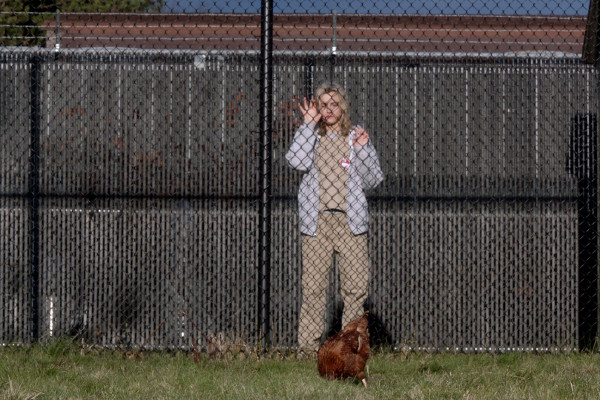
One of the great benefits of modern television, particularly on streaming services, is that it's less "made to order". Episode lengths can vary (season one ranges from a relatively uniform 52 minutes to just over an hour) and season lengths are often far shorter. With lengths generally ranging from 10-13 episodes with Netflix's original series, it also manages to discard "filler" in a way that the old 26-episode network shows couldn't.
Which is why The Chickening is such a surprise. Far from a terrible episode, it does give viewers chance to spend more time with the characters, but unfortunately a lot of that time is spent looking for a chicken. This does bring about some nice dialogue choices from Nick Jones ("Black girls hear about a chicken, of course this will happen." "Why, because all black people love chicken?" "Don't be racist! Because they're all on heroin.") but for such a relatively inconsequential episode, it's an odd choice to introduce pivotal character Tiffany "Pensatucky" Doggett. Considering Jones's other season one episode (Bora Bora Bora) involves a fatal overdose, it's perhaps only fair that he got to go "light" for this one entry.
Although shot continuity on the series was something repeatedly flagged during season five, it is occasionally notable here, such as the silly scene where Piper gives a motivational statement to Red... look out for a shot of Piper's nodding head from the rear view, indicating she's talking... when there's a pause in her dialogue. But speaking of shots, look out for the final cut shots that close the episode off to stunning effect.... Piper trapped behind a fence staring helplessly at her mythical chicken, which has become not only the plot McGuffin propelling the narrative forward, but also a metaphor for freedom.
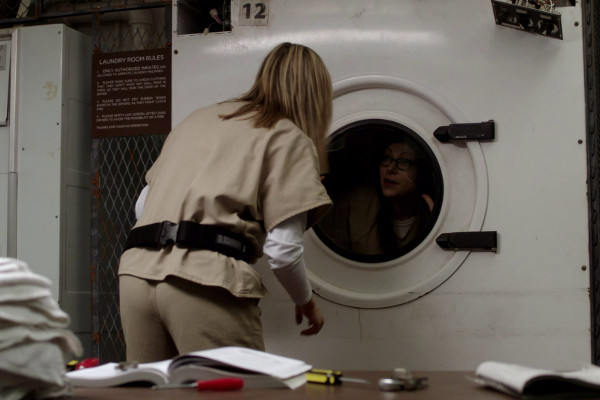
There's an embarrassing attempt at humour at the start of this episode, where Piper decides to do a Michael Jackson dance and the incidental music joins suit. It's a little cringy, especially as she's doing it in front of Miss Claudette, a character not known for her sense of humour. However, this seems to act as a character shortcut, explaining to viewers the easy way that tensions between them have now thawed out.
The rest of the episode cuts between flashbacks of Red and flashbacks of Piper, while also showcasing what a selfish individual Larry can be. Biggs was the big star name for the series, appearing in every episode, yet he got more and more sidelined, appearing in just nine episodes of season two before leaving the series. Aside from a flashback in season five (Tattoo You), the character was completely removed from the story.
There's a surprising moment where Nicholls, dismayed at Red's lack of sympathy for a fellow addict, gives up her contraband secrets to Pornstache. Yet the core theme of the episode is pregnancy... we see a time when Piper mistakenly thought she was pregnant and Larry urged her to have an abortion; Piper's friend Polly has her baby, as does Maria; and Daya has morning sickness. Perhaps appropriately, the end titles song this time is Whispering Jack Smith's version of Baby Face.
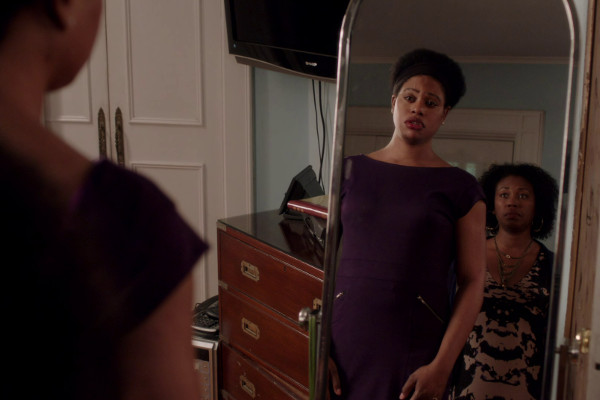
To go through all the various awards that Orange Is The New Black has been nominated for would take several articles in itself, with an enormous amount of plaudits, including four Emmys. Lesbian Request Denied was the recipient of two Primetime Emmy Nominations, both for Jodie Foster's direction, and, for the series as a whole, Laverne Cox's performance as Sophia.
While Cox's rising popularity led to her having limited time to appear in the show, it does often feel as if the producers didn't know what to do with Sophia after season one. While she would have been an odd fit for season two's darker themes and is virtually sidelined there, even post-season two she's relegated to what are little more than cameos.
Cox is always great in the role, though Sophia's presence in the series can be sometimes jarring as it shows evidence of the writer's hand in events. OITNB is known for its Earthy humour, with characters like Nicholls totally defying the perjorative of "political correctness". Yet Sophia is a character less conflicted, practically wearing a halo, with any of her prison detractors almost immediately met with some kind of karmic retribution - at least until season three.
It's not that the character's not a good one, just that she often doesn't seem to be realistically flawed as some of the others are. While the intent behind it is honourable, it does cause the show to feel more contrived in this area. Thankfully Lesbian Request Denied (a good episode, only kept this low because they're pretty much all good episodes from this season) shows Sophia's more selfish, inconsiderate side.
Despite such reservations about the writing, there are some characters in the episode who do discuss Sophia with the usual bluntness that is given to other characters. Natalie Figueroa, Executive Assistant to the Warden, has an observation on gender privilege with "why would anyone want to give up being a man? It's like winning the lottery and giving the ticket back." Ironically, it's left to Pornstache, the obnoxious prison guard, to give perhaps the most enlightened take on Sophia, albeit in his own very unique and inappropriate way: "I live in the present, not in the past. Besides, she used to have a dick, so she knows what it likes."
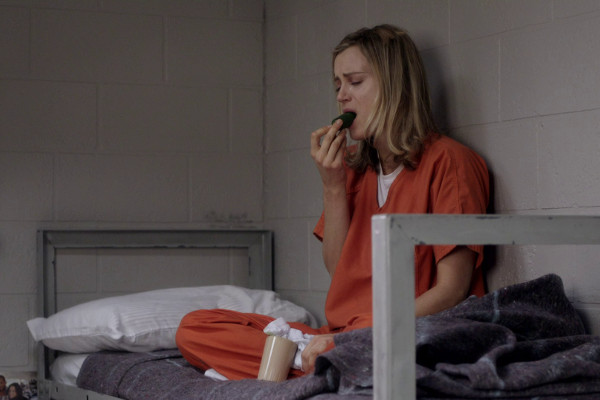
Tit Punch contains the entire effects and resolution of Piper being starved out by Red (Kate Mulgrew) after she accidentally insulted her food in the first episode. It's a crucial one as it's the first to show Piper's ingenuity, a trait that would stay with her throughout later seasons even when the rest of her character seemed lost.
The "tit punch" of the title comes from a second flashback tale, featuring the somewhat unlikely backstory of Red, with Mulgrew in an even unlikelier wig. This sequence does introduce the "orphaned punchline" joke that reappears in other episodes, whereby Red delivers a gag where the feedline isn't heard, and ends with a penguin saying "He's not an eggplant, he's retarded."
It's a curious yet likeable addition to the series, suggesting either the joke differs in different cultures, or that in the OITNB universe, it's a very popular joke: it's told again by an Hispanic character in The Chickening, and Nicholls tells it in the season finale, during which we learn it begins "so a penguin and a farmer walk into a bar...", and that it also involves umbrellas.